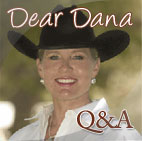Compounded vs. commercially prepared medications
By Daniel H. Grove, DVM

With our animals, we usually have to cover the costs of healthcare instead of having insurance or the government paying for it. This leads us to look for ways to save money anywhere we can often times. One of the ways is by looking for less expensive medications for our animals. Often times, compounded medications can be less, but there is a reason for it.
Brand name and generic medications are commercially prepared. These drugs must past FDA approval. This is a long and detailed process with studies done as to the efficacy, consistency, and safety of a drug. The FDA monitors these drugs even after they are approved for use. They monitor side effects, and production continuously to ensure the safety of the patients receiving them. With this oversight and regulation, the companies manufacturing these products have to maintain their production facilities with strict adherence to the regulations. It is not uncommon for production of a medication to be stopped for a period of time for updating a manufacturing process or plant to comply with FDA changes that occur. While no one probably lacks appreciation for this safety in the pipeline of medication manufacturing, many of us do not like the idea that it does cost money. Since we are the consumers of the product, we have to pay for this service. Also, if something goes wrong with the use of the medication, most of these companies will stand behind their products and want to make it right with their customers. They will help with testing and treatment of side effects.
Do I really need to vaccinate?
By Daniel H. Grove, DVM
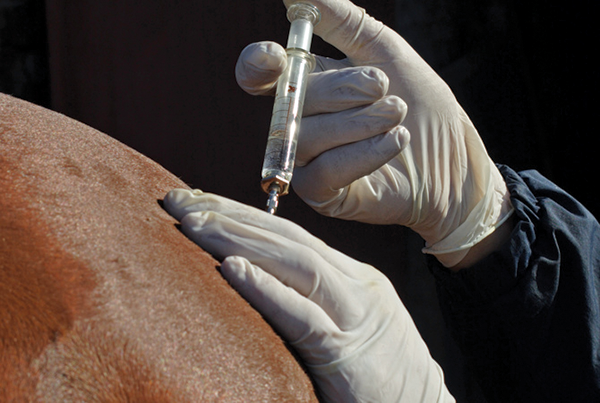
The vaccine debate is not limited to whether or not to vaccinate your children. The debate continues over into our pets also. With horses, some people have the unfortunate experience of vaccine reactions that give the pause for future vaccines. So, with such concern over the vaccination of animals, we will review what is considered the minimum vaccines for all horses and what the optional ones are. First, let’s answer the question, “Do I really need to vaccinate my horse?”
Tips when changing horse homes
By Daniel H. Grove, DVM

Moving to a new barn is not only stressful to your horse, but also for you. Bonds will be broken and new bonds made. Feed may change. Water may be different. Different diseases may be present. All of these things should be on your mind, and I will try to give you some pointers to help minimize the stress!
Moving to a new herd
Horses are herd animals. They are encoded to pack together for their own safety. They tend to make bonds with the horses around them and consider them part of the group, even if they are not all in a pasture together. When you disturb this bond, some horses get very upset. If you are moving and you have multiple horses, this may not be as big of an issue since they may be happy with just one or two others. If not, expect a few days of excessive vocalization and worry. You can discuss with your veterinarian the use of a product called Zylkene® that is made from colostrum. It is natural and makes the horse feel at home.
Cold weather care
By Daniel H. Grove, DVM
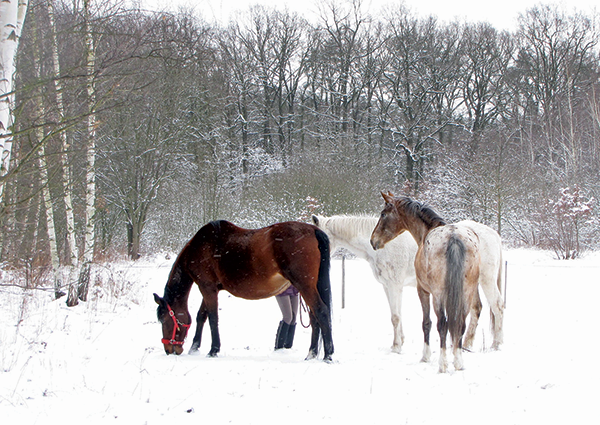
Cold, wet weather presents a few challenges that can usually be mitigated with a few extra precautionary tips. Horses are designed to be able to survive in a variety of climates, but through our manipulation and care, sometimes we impede their ability to thermoregulate in the winter time. Let’s discuss some key points on winter care.
Vet’s perspective: arena footing’s importance

By Daniel H. Grove, DVM
Arena footing comes in a wide variety of substrates. There are natural and man made materials used in their composition. In this article we will learn a few basics and then discuss some factors to look at from the veterinary side of injuries and their prevention.
When selecting a footing for your arena, there are some factors to take into consideration.
1) Shock absorption: Shock absorption or cushion is going to take strain off of the legs of your horses. While they do have built in structures to help with this, anything you can do to aid can be beneficial. If you run on concrete you are more likely to be sore than if you run on grass!
5-panel Testing
 As breeding season is right around the corner for those of us in the northern hemisphere, I think it is good to take into consideration genetic testing. The 5 panel test is a group of five diseases commonly found in quarter horses and related breeds. Knowing if your mare or stallion carries the genetic defects that can cause these diseases can help steer you to a breeding match that will prevent experiencing these debilitating diseases in the offspring.
As breeding season is right around the corner for those of us in the northern hemisphere, I think it is good to take into consideration genetic testing. The 5 panel test is a group of five diseases commonly found in quarter horses and related breeds. Knowing if your mare or stallion carries the genetic defects that can cause these diseases can help steer you to a breeding match that will prevent experiencing these debilitating diseases in the offspring.
HYPP
HYPP (Hyperkalemic Periodic Paralysis) is a disease that results in uncontrolled muscle spasms and/or paralysis. They can be as severe as to cause death. The defect results in too much potassium being leaked into the blood stream. It can be managed by a low potassium diet and also the use of potassium wasting diuretics. If a horse has 2 copies of the gene, they are most likely to manifest signs. If one copy of the gene, less likely.
Strangles and Biosecurity
 We had a question come in regarding strangles. This year, the American College of Veterinary Internal Medicine (ACVIM) came out with a consensus statement on this disease. I will go over the key items discussed and the bio-security measures they recommend. These recommendations apply to any outbreak of contagious disease, although each disease may have some minor changes.
We had a question come in regarding strangles. This year, the American College of Veterinary Internal Medicine (ACVIM) came out with a consensus statement on this disease. I will go over the key items discussed and the bio-security measures they recommend. These recommendations apply to any outbreak of contagious disease, although each disease may have some minor changes.
Strangles is a term used to describe a bacterial infection caused by the organism Streptococcus equi ssp equi. The common presentation is a respiratory disease with lymph node enlargement. Horses typically have a fever and severe nasal discharge. The bacteria starts to be shed in nasal secretions 2-3 days after the onset of fever and typically persists for 2-3 weeks. It is recommended that all recovered horses be treated as potentially infectious for six weeks after the resolution of purulent (pus) discharge. From 20-25 percent of horses recovering from the disease can become susceptible to a second attack of the disease. An average of 10 percent of horses will have a persistent infection in their guttural pouches, which are located in the throat area and can test positive from that area for months to years without showing outward clinical signs. These types of animals, healthy without showing signs, are thought to be more important in the spread of the disease as they are not recognized as sick.
Checklist for Fall
Fall is here, and it is a great time to visit on items to take care of on our horses. It is a great time as show season is slowing down and the temperatures are more pleasant. So, let’s go over some items to consider for the fall.
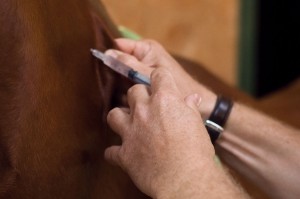 First is vaccines—If you need Flu/Rhino boosters due to your situation, now is the most common time to get them.
First is vaccines—If you need Flu/Rhino boosters due to your situation, now is the most common time to get them.
Fecal Egg Count—Twice a year, you should be testing your horse’s parasite load and deworming appropriately
Dentistry—This is a great time of year to have those points removed and any abnormalities resolved. Going into winter, you want your horse getting the most from its feed.
Lights—If you are planning on breeding in the late winter or early spring, you want your horses ready to go and cycling properly. Day length plays a role in both the mare’s and stallion’s reproductive cycle.
Elective surgeries—Things like castrations can be done most any time, but if possible, I like to do them this time of year. The weather is cooler and there are less flies. The horses usually heal a little more quickly and with less complications
Blanketing—If you do blanket, it is time to make sure they are in good order and depending upon wehre you live, time to start using them!
As the year is winding down and we are getting into holiday season, do not forget some of the extra needs your horse may need this time of year.
It is also important to make sure your horse’s housing in is good order. With wind, rain, and cold on the way, it is good to make sure any repairs have been taken care of and for those of us in areas that freeze, that our water heaters are functioning properly.
Also, do not neglect the hay storage areas. Water getting on hay is destructive. Pests are looking for somewhere to set up shop. You need to protect your hay from water, rats, mice and rabbits.
Hopefully this list stokes some ideas on things to get taken care of. Happy Thanksgiving!
Home stretch of the show season
 For most people, we are rounding the last corner and headed to the finish line for show season. Many equine athletes have been going hard all spring and summer. Keeping our horses sound and performing at their peaks takes some extra efforts on our part. I will try to touch on some key points that can be beneficial to keeping our horses happy and performing.
For most people, we are rounding the last corner and headed to the finish line for show season. Many equine athletes have been going hard all spring and summer. Keeping our horses sound and performing at their peaks takes some extra efforts on our part. I will try to touch on some key points that can be beneficial to keeping our horses happy and performing.
First off is nutrition. When traveling, I would recommend keeping your horses diet as close to normal as possible. Take at least the supplements and concentrate feeds that you feed at home. If you can, take the same hay also. Changing diets on the road can lead to colic and lost competition days. While we are on nutrition, I feel it is really important to keep a performance horse on a good quality joint supplement and vitamin mineral supplement. You want their joints as comfortable as possible. You also want their metabolism working at its peak to give them the energy they need.
Beat the heat
 Well, August is here and so is the heat. July showed us some very hot temperatures, but we still have the late summer and early fall heat waves to deal with. We have discussed most of this before, so here are some reminders.
Well, August is here and so is the heat. July showed us some very hot temperatures, but we still have the late summer and early fall heat waves to deal with. We have discussed most of this before, so here are some reminders.
1. The cornerstone to surviving this heat for our horses is water. Access to plenty of clean and cool water is essential.


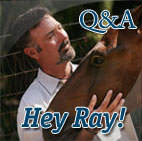
 Read Columns
Read Columns
